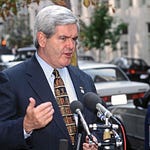In this episode, I welcome my friend and New School colleague, Natalia Mehlman Petrzela, to join me in a conversation about the history of exercise culture in the United States. Her new book, Fit Nation: The Gains and Pains of America's Exercise Obsession (University of Chicago Press, 2023), tracks the history of Americans’ investment in fitness.
Taking her readers from late nineteenth-century performances of bodybuilding through today’s glittering gyms, elite studio classes, celebrity instructors, and extreme sports, Petrzela—a scholar, journalist, and podcaster who has a not-so-secret life as an IntenSati leader—both explores an American obsession with fitness and health that is, at the same time, out of reach for so many.
Program notes:
The opening sound clip of Jack LaLanne was taken from the first episode of his home exercise television show, which debuted on September 28, 1953. You can watch and listen to the whole show here. Read more about Jack’s path to fitness and the movement he started in The Jack LaLanne Way to Vibrant Health (Prentice-Hall, 1961).
As Claire mentions in the introduction, health expert Sylvester Graham was a prolific author whose beliefs encompassed the consumption of whole grains and the practice of chastity. You can learn more about his theories in Stephen Nissenbaum’s Sex, Diet, and Debility in Jacksonian America: Sylvester Graham and Health Reform (Praeger, 1980). And consider exploring the theories of John Harvey Kellogg, whose Battle Creek Sanitarium became ground zero for the breakfast cereal industry, in Howard Markel, The Kelloggs: The Battling Brothers of Battle Creek (Vintage: 2018).
Natalia mentions the origins of the “fit body” in popular performances known as “freak shows”: learn more about the history of these turn-of-the-century events in Gary Cross, Freak Show Legacies: How the Cute, Camp and Creepy Shaped Modern Popular Culture (Bloomsbury Academic, 2021).
While discussing Teddy Roosevelt’s promotion of physical fitness and its relationship to strengthening and perpetuating the “white race,” Natalia namechecked Gayle Bederman’s Manliness and Civilization: A Cultural History of Gender and Race in the United States, 1880-1917 (University of Chicago Press, 1996).
Natalia and Claire discuss the history of tensions surrounding women’s sports, organized athletic competition, femininity, and female sexuality: listeners who want to dig into this topic should check out Susan Cahn, Coming On Strong: Gender and Sexuality in Women's Sport (University of Illinois Press, 2015).
Natalia discusses the excitement of writing a history of something that has been a part of her life but notes that it has challenges too. Listeners who want to follow up on what it means to write such a history might want to explore the essays in Claire Potter and Renee Romano, Doing Recent History: On Privacy, Copyright, Video Games, Institutional Review Boards, Activist Scholarship, and History That Talks Back (University of Georgia, 2012).
Learn more about Joseph Pilates in John Howard Steele, Caged Lion: Joseph Pilates and His Legacy (Long Leaf Press, 2020), and about yoga in Ramesh Bjonnes, A Brief History of Yoga: From Its Tantric Roots to the Modern Yoga Studio (Innerworld Publications, 2018).
Jane Fonda discusses her public embrace of fitness and the creation of her workout videos in chapter fifteen of her memoir, My Life So Far (Random House, 2005).
Natalia namedrops Michelle Goldberg’s book on the history of yoga in the United States, The Goddess Pose: The Audacious Life of Indra Devi, the Woman Who Helped Bring Yoga to the West (Vintage Books, 2016).
Claire asks Natalia how Fit Nation relates to her first book, Classroom Wars: Language, Sex, and the Making of Modern Political Culture (Oxford University Press, 2017).
Natalia credits Keeanga-Yamahtta Taylor as a historian who shaped her thought about race, class, and consumer culture: to read more about concept of “predatory inclusion,” you can read Taylor’s Race for Profit: How Banks and the Real Estate Industry Undermined Black Homeownership (University of North Carolina, 2021).
Short takes:
This week’s primary social media news was Elon Musk de-platforming six journalists—who cover him—from Twitter. It was stunning and led to a massive jump in my followers on Mastodon and Post: I suspect this was true across the board because Mastodon always gets a little janky when volume spikes. But as Jason Abbruzzese, Kevin Collier, and Phil Helsel noted at NBC.com, what happened next was even more shocking. Musk joined a Twitter Space devoted to talking about the incident “before an audience of more than 30,000 listeners,” snapped at everyone, and left. Minutes later, Twitter Spaces was disabled for all users. Later, Musk tweeted: "we're fixing a Legacy bug. Should be working tomorrow." The guy has a bad case of fuckingnutsitis. (December 16, 2022)
How do intelligent people spend their twenties getting some of the best educations the United States offers but with few prospects for employment in the work they were trained to do? At Jacobin, historian Hannah Leffingwell breaks it down for you. As she argues, academic life is not unlike a cult. “Lots of people at the bottom, paying for trainings and working for free,” Leffingwell writes, “sacrificing more and more of their lives to prove their loyalty to the organization; and a small handful of people at the top, reaping the benefits, perpetuating an `illusion of hope’ that those at the bottom can succeed too if they just work hard enough.” (December 13, 2022)
I re-subscribed to The Atlantic just to read this profile of Marjorie Taylor Greene by Elaina Plott Calabro. “She did as she was supposed to do, graduating from South Forsyth High and then packing up and moving an hour and a half away, to Athens, for four years at the University of Georgia,” Calabro writes, tracing Greene’s evolution from a fairly ordinary, upper-middle-class existence in a Georgia suburb to one of the whackiest of all whack jobs in Congress. But Calabro emphasizes one thing: she’s smart. And that’s why she’s so dangerous. (December 5, 2022)

















Share this post